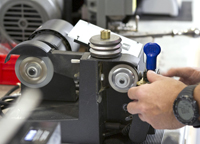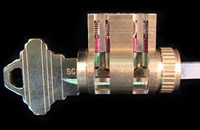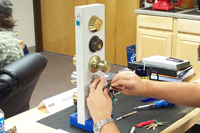Physical Security Lock Training
Physical Security Lock Training
- Course Length: 5 Days
- Class Time: 9am - 5pm
- Course Fee: $2,450
- Note: For offsite scheduling, a quote must be given.
- Registration Fee: $0.00 (No additional fees!)
- Course Code: EDUPPSLT
- Course Location: Nicholasville, KY or off-site location per quote
This course has the flexibility to either be hosted in Nicholasville, KY at the MBA USA, Inc. Training Facility, or at an off-site location per request. For off-site training, a per class fee must be quoted.
Click here for our full course schedule
Our 5-day Physical Security Lock Training course teaches the skills necessary for anyone working within the Physical Security field to understand and identify the basic concepts for locksmithing, security hardware, and GSA approved container requirements. It was created to give those who are just starting a career in security and/or locksmithing, who require a background in the basics of locksmithing and security hardware as part of their job in the military or other government service. It is also ideal for anyone considering a locksmithing career but who wishes to first learn more about the trade. All tools and training aids/materials are provided to the student to facilitate instruction.
Course features:
- Overview of basic lock designs and how they operate
- How to use identify keys and use a key blank directory
- Using a key duplicating machine
- Basic concepts to rekey locks
- Direct codes and blind codes
- How to use code software to locate code information
- Basics of masterkeying
- Lock picking overview
- Interchangeable core locks
- High Security Locks
- Introduction to GSA Containers and Vault Doors
- Locks used on GSA approved containers, vault doors, SCIF's and other secure areas.
Do you need this class? Test yourself with these questions:
- How do you determine a lock requirement for GSA approved containers?
- Does masterkeying increase or decrease security?
- How do you reset a KABA Eplex lock to the factory code?
- What is the most likely problem with a cylinder that works OK until it is inverted?
- Why are interchangeable cores a preferred practice for buildings with complex keying schemes?
- What are DND keys and what is the key control requirement?




